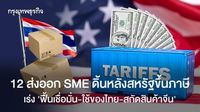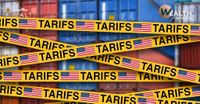In a bold move that has sent shockwaves through global trade, President Donald Trump has implemented a Reciprocal Tariff policy affecting over 180 countries, including Thailand. Starting April 9, 2025, Thailand will face a staggering 36% increase in tariffs on its imported goods, a decision that experts warn could severely impact the Thai economy.
The announcement has raised eyebrows among economists and business leaders alike, with many questioning the rationale behind targeting Thailand with such high tariffs. The Thai government is scrambling to understand the implications of this policy, as it could lead to a contraction in the country’s GDP by as much as 1%, according to various economic forecasts.
In 2024, Thai small and medium-sized enterprises (SMEs) exported goods worth $7.634 billion to the United States, accounting for 14% of Thailand's total exports. However, with the new tariffs in place, these figures are expected to decline dramatically. The Office of Small and Medium Enterprises Promotion (OSMEP) predicts that by 2025, the value of SMEs' exports to the US could plummet by $1.128 billion, resulting in a potential GDP reduction of 0.2%.
"The impact of these tariffs will be felt across various sectors, particularly those heavily reliant on exports to the US," said Dr. Supavudhi Saicheua, a prominent economist and advisor to the Thai government. He emphasized that the severity of the impact will largely depend on the government’s negotiation strategies with the US and the responses from other trading partners.
The top five categories of Thai exports to the US include electrical appliances, machinery, jewelry, furniture, and rubber products. Each of these sectors is poised to face significant challenges under the new tariff regime. For instance, the electrical equipment sector, which includes smartphones and digital cameras, has a total export value of $2.792 billion, with SMEs making up 34% of that market.
"If tariffs are imposed, we could see a massive decline in our export volumes, which would hurt not just our economy but also the livelihoods of thousands of workers in these industries," warned Dr. Saicheua.
In the first two months of 2025, Thai SMEs managed to export $1.440 billion worth of goods to the US, marking a 39.6% decrease from the previous year. This decline is alarming, especially considering that the US is the second-largest export market for Thai SMEs after China.
The impact of the tariffs is not just theoretical. Business leaders are already reporting a slowdown in orders from US clients, as companies brace for the financial repercussions of the new trade landscape. "Our clients in the US are confused and concerned about the new tariffs. They are hesitant to place orders until they understand how these changes will affect pricing and availability," said a representative from a leading Thai manufacturing firm.
Moreover, the tariffs could exacerbate existing trade imbalances. In 2024, Thai SMEs imported $2.563 billion worth of goods from the US, resulting in a trade surplus of $5.070 billion. However, with the new tariffs, this surplus is at risk. Economists are urging the Thai government to seek new markets and partnerships, particularly through free trade agreements (FTAs), to mitigate the impacts of the tariffs.
In response to the looming crisis, the Thai government is considering various strategies to bolster the economy. Suggestions include enhancing local production capabilities, diversifying export markets, and focusing on high-quality products that can compete globally.
"We need to pivot quickly and find new avenues for growth that do not rely solely on the US market," said Dr. Saicheua. He stressed the importance of building strong trade relationships with other countries, particularly those in the ASEAN region.
As Thailand navigates this turbulent trade environment, the government is also under pressure to support its SMEs, which are vital to the country’s economic health. The Ministry of Commerce plans to hold meetings with business leaders to discuss potential strategies and support measures.
Concerns are growing that if the situation is not managed effectively, Thailand could see a surge in imports from other countries, particularly China, as businesses look for ways to circumvent the tariffs. This could lead to an influx of goods that might not meet Thai standards, further complicating the trade landscape.
In the agricultural sector, the implications of the new tariffs are equally concerning. Thailand's rice exports, which have traditionally been a stronghold in the US market, may face a 36% tariff, significantly impacting farmers and consumers alike. Despite the challenges, some industry leaders remain optimistic about the resilience of Thai products, particularly jasmine rice, which is still favored by consumers in the US.
"While the tariffs will undoubtedly increase costs, we believe that the quality of Thai rice will continue to attract buyers in the US," stated Wanwadee Kittirungsi, a rice exporter. She noted that despite the tariff, demand for high-quality Thai rice remains strong.
As the situation evolves, the Thai government is expected to ramp up its diplomatic efforts to negotiate with the US and explore potential concessions. However, with Trump’s administration known for its unpredictable trade policies, the outcome remains uncertain.
In conclusion, the new Reciprocal Tariff policy poses significant challenges for Thailand's economy, particularly for SMEs and export-dependent sectors. As the government prepares to respond, the focus will be on negotiation strategies and exploring new markets to ensure the sustainability of Thailand’s economic growth in the face of adversity.







